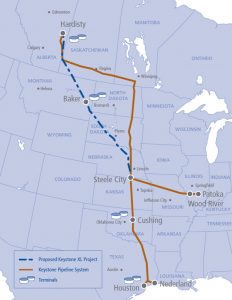
Following President Donald Trump’s approval of a permit to move forward on building the $8 billion Keystone XL pipeline, U.S. Reps. Bill Flores (R-TX), French Hill (R-AR) and Kristi Noem (R-SD) highlighted the project’s ability to generate jobs and promote economic growth.
The northern portion of the Keystone XL pipeline, which requires a presidential permit because it will cross an international border, has been in limbo for more than eight years. Energy company TransCanada will build the pipeline, which will move 800,000 barrels of oil per day to Gulf Coast refineries, reducing the United States’ dependency on foreign oil. The Obama administration had canceled the pipeline project in 2015.
“Building the Keystone XL pipeline will foster economic growth, create thousands of jobs for Americans and enhance energy security for America,” Flores said. “Approving the long overdue Keystone XL pipeline allows the United States access to secure, stable oil supplies from a strong North American ally. It will also help reduce our reliance on unstable Middle Eastern energy sources.”
Hill, meanwhile, called Keystone XL a pro-growth, private sector investment in energy infrastructure that has already supported more than 600 jobs in Arkansas and would create thousands of additional private sector jobs.
“I appreciate the president and the new administration beginning to fulfill their promise of pro-growth policies that will help lead to North American energy independence,” Hill said.
Access to energy is central to improving national security, Noem said, and building a more robust economy with better jobs and higher wages.
“Not only does the Keystone XL Pipeline offer these large-scale benefits for our country, its construction will translate into added revenue for cash-strapped South Dakota counties, relief on our roads and rails and job opportunities for folks across our state,” Noem said. “I’m glad to see President Trump move forward on this critical piece of American infrastructure.”



